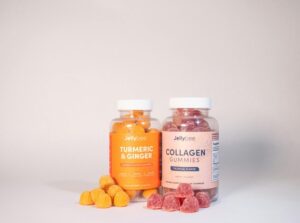
Imagine your skin as a fine tapestry, reliant on collagen to maintain its strength and elasticity. As we age, collagen production naturally declines, leading to visible signs of aging. But the good news is, you can take charge of this process. By making mindful dietary and lifestyle choices, you can boost your collagen levels and enhance your skin’s health. Discover the key nutrients and habits that can transform your skin from within.
Understanding Collagen and Its Importance
Collagen, often dubbed the body’s scaffolding, plays a crucial role in maintaining skin elasticity, joint health, and overall structural integrity.
It’s the most abundant protein in your body, found in skin, bones, muscles, and tendons. As you age, collagen production naturally declines, leading to wrinkles, sagging skin, and joint discomfort.
Understanding collagen’s importance helps you appreciate why you should support its levels. It provides structure and strength, making it essential for healing wounds and maintaining healthy tissues. Recent research indicates that collagen loading can significantly enhance your body’s collagen levels, especially after the age of 30.
By recognizing its role, you can take actionable steps to preserve your collagen levels, ensuring your skin stays youthful and your joints remain functional.
Prioritizing collagen in your lifestyle can lead to improved health and vitality.
Key Nutrients That Promote Collagen Production
To support your body’s collagen production, incorporating key nutrients into your diet is essential.
Vitamin C plays a crucial role in collagen synthesis, so include citrus fruits, bell peppers, and leafy greens in your meals.
Additionally, amino acids like proline and glycine, found in eggs, dairy, and meat, are vital for collagen formation.
Zinc, present in nuts, seeds, and whole grains, also supports collagen production by aiding in the healing process.
Omega-3 fatty acids, found in fatty fish, can help maintain skin elasticity and hydration.
Lastly, antioxidants from fruits and vegetables combat oxidative stress, protecting collagen from damage.
Prioritizing these nutrients won’t only enhance collagen production but also promote overall skin health.
Foods Rich in Collagen
Incorporating foods rich in collagen into your diet can significantly boost your body’s collagen levels and support skin health.
Bone broth is a top choice, as it’s packed with collagen extracted from bones and connective tissues. Additionally, fish, particularly the skin, provides a great source of collagen, along with essential amino acids.
Chicken skin is another excellent option, as it contains high amounts of collagen. You might also consider eating egg whites, which are rich in proline, an amino acid crucial for collagen production.
Finally, dairy products like yogurt and cheese can contribute to your overall collagen intake.
Antioxidants and Their Role in Collagen Health
While you may already be focused on boosting your collagen intake through diet, don’t overlook the vital role antioxidants play in maintaining collagen health. Antioxidants help combat oxidative stress, which can damage collagen fibers and accelerate aging. By neutralizing free radicals, antioxidants protect your skin and connective tissues, ensuring they remain strong and resilient.
Incorporate antioxidant-rich foods like berries, dark chocolate, and leafy greens into your meals. Vitamin C, found in citrus fruits and bell peppers, plays a crucial role in collagen synthesis and protection.
Additionally, consider incorporating green tea, which is packed with polyphenols that support collagen integrity. By prioritizing antioxidants, you’ll enhance the effectiveness of your collagen-boosting efforts, promoting healthier skin and joints.
The Power of Bone Broth
Bone broth is a powerful ally in your quest to boost collagen levels naturally. Rich in gelatin, which is derived from collagen, it provides essential amino acids like proline and glycine that support collagen production.
By simmering bones, connective tissues, and cartilage, you extract these nutrients, making them easily absorbable by your body. Regularly consuming bone broth can enhance skin elasticity and joint health, making it a practical addition to your diet.
You can enjoy it as a warming drink, use it in soups, or incorporate it into sauces. Aim for homemade varieties to maximize nutrient content, or choose high-quality store-bought options.
Embrace bone broth as a delicious way to nourish your body and promote collagen synthesis effectively.
Incorporating Vitamin C for Collagen Synthesis
To boost your body’s collagen production, adding vitamin C to your diet is essential. This powerful antioxidant plays a crucial role in collagen synthesis, helping to stabilize collagen molecules and enhance their strength.
Citrus fruits like oranges and grapefruits, along with strawberries and kiwi, are excellent sources of vitamin C. You can also find it in bell peppers, broccoli, and spinach. Aim for at least 75-90 mg of vitamin C daily to support your body’s collagen needs.
Incorporating these foods into your meals is easy; toss berries into your yogurt or add bell peppers to your salads. By prioritizing vitamin C-rich foods, you’ll not only boost collagen synthesis but also improve your overall skin health and vitality.
Lifestyle Habits That Support Collagen Levels
In addition to incorporating vitamin C into your diet, adopting certain lifestyle habits can significantly support your collagen levels.
Prioritize getting adequate sleep, as quality rest promotes collagen production and skin repair. Regular exercise also plays a critical role; it boosts circulation, delivering nutrients and oxygen to skin cells.
Additionally, avoid excessive sun exposure and use sunscreen daily to protect your skin from UV damage, which can break down collagen. Limit smoking and alcohol consumption, as both can deplete collagen and accelerate aging.
Lastly, manage stress through practices like meditation or yoga, since chronic stress can adversely affect collagen synthesis.
The Impact of Hydration on Skin Elasticity
While you may not realize it, hydration plays a crucial role in maintaining skin elasticity and overall health. When your body is well-hydrated, your skin retains moisture, which helps maintain its firmness and suppleness.
Dehydrated skin can appear dull, sagging, and more prone to wrinkles. Research shows that adequate water intake promotes collagen production, enhancing skin structure.
Aim for at least eight 8-ounce glasses of water daily, adjusting based on your activity level and climate. Incorporating hydrating foods, like cucumbers and oranges, can also boost your moisture intake.
Remember, maintaining proper hydration not only benefits your skin’s elasticity but also supports your overall well-being, helping you look and feel your best.
Prioritize hydration for radiant, youthful skin.
Mindful Practices to Reduce Collagen Breakdown
When you adopt mindful practices, you can significantly reduce collagen breakdown and promote healthier skin.
Start by managing stress through techniques like meditation, yoga, or deep-breathing exercises. Chronic stress releases cortisol, which can accelerate collagen degradation.
Additionally, ensure you get enough sleep; quality rest is essential for skin repair and regeneration. Incorporate a balanced diet rich in antioxidants, vitamins C and E, and omega-3 fatty acids to combat oxidative stress.
Limiting sun exposure and using sunscreen also protects collagen from UV damage. Lastly, stay hydrated, as proper hydration supports skin elasticity and overall health.






